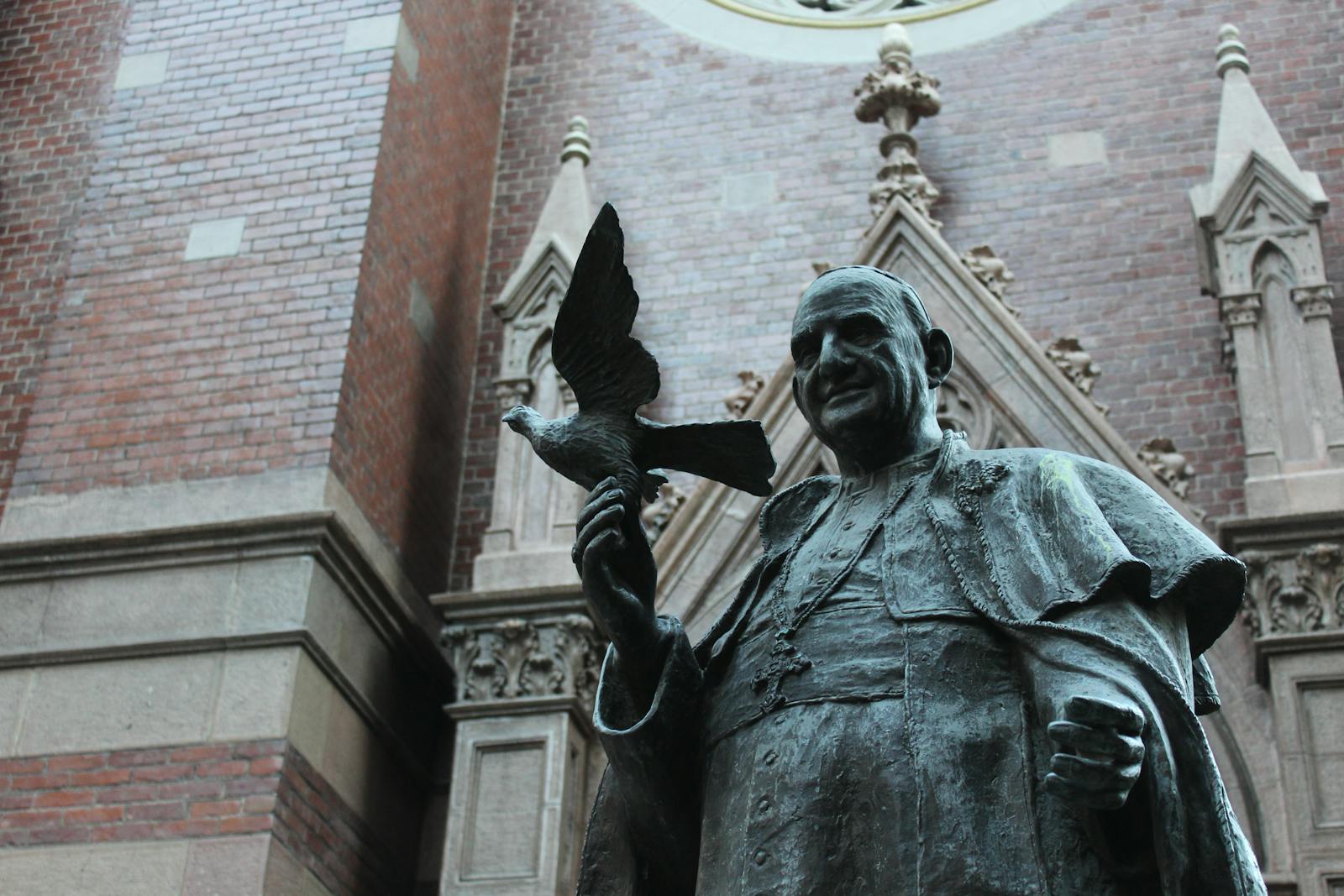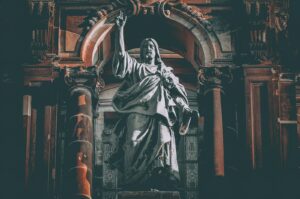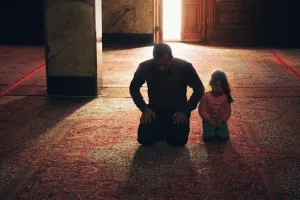The Pope, as the head of the Roman Catholic Church, is often considered one of the most influential religious figures in the world. Leading a global faith of more than 1.3 billion Catholics, the Pope wields immense spiritual authority. However, the power of the Pope goes beyond just religious influence. The Pope is also the leader of the Vatican City, the smallest sovereign state in the world, which gives him unique political and diplomatic power.
In today’s world, where religion, politics, and global diplomacy are often intertwined, the Pope’s influence extends far beyond the confines of the Vatican. He plays a key role in international affairs, is a mediator in conflicts, advocates for social justice, and speaks on a wide range of global issues from climate change to poverty and human rights. The question of “how powerful is the Pope?” requires exploring his spiritual authority, political role, diplomatic power, and his influence on both religious and secular affairs. In this article, we will unpack the various dimensions of papal power and examine how the Pope’s influence is exercised on the world stage.
1. The Pope’s Spiritual Power: Supreme Authority Over the Catholic Church
At the core of the Pope’s power is his role as the spiritual leader of the Roman Catholic Church. The Pope is seen as the direct successor to St. Peter, whom Catholics believe was appointed by Jesus Christ as the first leader of the Christian Church. This gives the Pope not only spiritual authority but also a unique position in Catholic theology, as the “Vicar of Christ” on Earth. His spiritual power is rooted in his ability to interpret Catholic doctrine, make decisions on Church teachings, and guide the faithful.
The Pope’s spiritual authority is formalized in the doctrine of papal primacy, which asserts that the Pope holds supreme authority over all other bishops and clergy in the Church. This means that the Pope has the final say on matters of faith, morals, discipline, and Church governance. The Pope’s authority is bolstered by the doctrine of papal infallibility, which was defined during the First Vatican Council in 1870. According to this doctrine, the Pope is considered infallible when he makes official declarations on matters of faith and morals, known as ex cathedra statements. While this power is rarely used, it underscores the Pope’s unique role as the ultimate authority on Catholic doctrine.
The Power of Excommunication
One of the most significant spiritual powers the Pope holds is the ability to excommunicate individuals from the Church. Excommunication is a formal exclusion from participation in the sacraments and community of the Church. While it is rare for a Pope to personally excommunicate someone, this power remains an important symbol of the Pope’s authority to protect the integrity of Church teachings. Throughout history, Popes have excommunicated kings, emperors, and even entire nations when they defied Church authority.
While excommunication does not have the same impact in today’s secular world as it did in the past, it remains a powerful tool within the Church. For devout Catholics, being excommunicated is a serious spiritual consequence, as it places them outside the Church’s communion and, by extension, outside the hope of salvation until reconciliation is achieved.
Global Influence Over the Faithful
The Pope’s spiritual authority is not limited to doctrinal pronouncements; it also extends to his role as a global religious leader who guides the faithful in their spiritual and moral lives. Every Pope is seen as a moral beacon for Catholics worldwide, offering guidance on how to live out their faith in modern society. Papal encyclicals, letters, and other writings have a profound influence on the Church’s approach to social, moral, and ethical issues. For example, Pope Francis’ 2015 encyclical Laudato Si’ called for urgent action on climate change and environmental stewardship, framing the issue as a moral and spiritual responsibility for Catholics.
The Pope’s spiritual authority also includes presiding over the College of Cardinals, the body responsible for advising the Pope and electing his successor. This gives the Pope significant control over the future direction of the Church, as he appoints new cardinals, who are typically aligned with his theological vision.
2. The Pope’s Political Power: The Head of a Sovereign State
In addition to his spiritual authority, the Pope is also the head of the Vatican City, a sovereign city-state that operates independently of Italy. Vatican City, established as an independent state in 1929 through the Lateran Treaty, is the world’s smallest country, but its unique status gives the Pope significant political power. As the sovereign of Vatican City, the Pope holds absolute legislative, executive, and judicial authority within its borders.
The Vatican’s Political Structure
Although the Vatican is small in size, it operates much like any other sovereign state. The Pope oversees the governance of Vatican City through the Roman Curia, the administrative apparatus of the Holy See, which functions like the executive branch of the Vatican government. The Curia assists the Pope in managing the day-to-day affairs of both Vatican City and the broader Roman Catholic Church. The Vatican also has its own postal service, banking system, and media outlets, including Vatican Radio and L’Osservatore Romano, the official Vatican newspaper.
Vatican City has its own security forces, most notably the Swiss Guard, who are responsible for the protection of the Pope and the security of Vatican territory. The Pope’s political power within the Vatican is absolute, as he is not subject to the authority of any other nation or external institution. This ensures that the Church can operate independently of secular governments, allowing the Pope to exercise his spiritual and political power without interference.
Diplomatic Power: The Holy See’s Global Influence
One of the most unique aspects of the Pope’s political power is his role as the head of the Holy See, the ecclesiastical jurisdiction of the Catholic Church. The Holy See is recognized as a sovereign entity in international law, separate from Vatican City itself, and it maintains diplomatic relations with over 180 countries. The Holy See sends and receives ambassadors, known as apostolic nuncios, and participates in major international organizations such as the United Nations.
The Pope’s diplomatic influence is considerable. Popes have historically acted as mediators in international conflicts, and their moral authority gives them a unique platform to engage in global diplomacy. For example, Pope John Paul II played a significant role in the fall of communism in Eastern Europe, particularly in his native Poland. His support for the Solidarity movement and his calls for freedom and human rights were instrumental in undermining the legitimacy of the communist regime.
More recently, Pope Francis has been involved in diplomacy between nations, such as his role in helping to broker the re-establishment of diplomatic relations between the United States and Cuba in 2014. The Pope’s ability to act as a neutral, moral arbiter on the world stage allows him to influence peace negotiations, humanitarian efforts, and global political discourse.
3. The Pope’s Role as a Global Advocate for Social Justice
In addition to his spiritual and political power, the Pope wields significant influence as an advocate for social justice and human rights. Throughout history, Popes have spoken out on a range of social issues, including poverty, inequality, war, peace, and the environment. The Pope’s moral authority gives him a powerful voice in global discussions on these issues, and his words often resonate far beyond the Catholic community.
Advocacy for the Poor and Marginalized
One of the hallmarks of recent papacies, particularly that of Pope Francis, has been a strong emphasis on advocating for the poor and marginalized. Pope Francis, in particular, has consistently called attention to the plight of the poor, the dangers of consumerism, and the structural injustices that perpetuate poverty and inequality. In his apostolic exhortation Evangelii Gaudium, Francis criticized the “economy of exclusion” that leaves millions of people on the margins of society.
The Pope’s advocacy for the poor is not limited to words; it is often accompanied by direct action. For example, the Vatican operates numerous charitable organizations worldwide, including Caritas Internationalis, which provides humanitarian aid to people in need, regardless of their religion or nationality. The Pope’s support for these efforts reinforces his commitment to addressing global poverty and promoting the dignity of all individuals.
Calls for Peace and Nonviolence
The Pope is also a powerful advocate for peace and nonviolence. Throughout history, Popes have used their platform to condemn war and call for peaceful resolutions to conflicts. Pope Benedict XV, during World War I, famously referred to the conflict as the “suicide of civilized Europe” and made numerous attempts to mediate peace between the warring nations. Pope John Paul II was an outspoken critic of the Iraq War, arguing that war should only be used as a last resort and that peaceful diplomacy should always be the first course of action.
Pope Francis has continued this tradition, frequently speaking out against wars and violence around the world. He has been an advocate for refugees fleeing conflict zones and has called on nations to show compassion to those displaced by war. The Pope’s message of peace is rooted in the Catholic Church’s long-standing tradition of just war theory, which emphasizes that war is only morally permissible under strict conditions.
Environmental Stewardship and Climate Change
Another area where the Pope’s influence has been particularly visible is in the realm of environmental stewardship. Pope Francis’ encyclical Laudato Si’, published in 2015, was a groundbreaking document that framed environmental issues, such as climate change and the destruction of natural ecosystems, as moral and spiritual crises. In the encyclical, Francis called for a global effort to protect the environment, emphasizing the responsibility of humans to care for God’s creation and to act in solidarity with the poor, who are disproportionately affected by environmental degradation.
The Pope’s strong stance on environmental issues has resonated with both religious and secular audiences, and Laudato Si’ has been cited by environmental activists, policymakers, and international organizations as a moral call to action on climate change. The Pope’s ability to influence global discourse on this issue demonstrates the breadth of his power as a moral leader on matters that affect all of humanity, not just Catholics.
4. Limitations on the Pope’s Power
While the Pope wields significant influence in both spiritual and political realms, his power is not without limitations. Within the Catholic Church, the Pope is bound by centuries of tradition and Church law, and his decisions are subject to the broader structures of the Church. For example, while the Pope has the authority to appoint cardinals and bishops, these appointments must align with the Church’s doctrine and tradition. The Pope’s power is also balanced by the College of Cardinals and the Roman Curia, both of which play essential roles in Church governance.
Additionally, the doctrine of papal infallibility—often misunderstood as meaning that the Pope is infallible in all matters—is limited to specific instances when the Pope speaks ex cathedra on matters of faith and morals. Outside of these rare declarations, the Pope’s decisions are subject to debate and interpretation, both within the Church and among the global Catholic community.
On the political stage, while the Pope has diplomatic influence, he does not wield military or economic power like the leaders of nation-states. His authority is primarily moral and spiritual, and his ability to influence world events depends on his ability to persuade, inspire, and mediate. Unlike secular rulers, the Pope cannot impose his will through force, which limits his direct power in political affairs.
Conclusion
The power of the Catholic Pope is multifaceted, spanning spiritual, political, and global realms. As the spiritual leader of over 1.3 billion Catholics, the Pope holds supreme authority over the Roman Catholic Church, guiding the faithful in matters of faith, morals, and doctrine. His role as the head of the Vatican City and the Holy See grants him unique political power as the leader of a sovereign state with diplomatic relations around the world.
The Pope’s influence extends beyond the Catholic Church, as he is a global advocate for peace, social justice, environmental stewardship, and human rights. Through his moral authority, the Pope plays a critical role in shaping global discourse on issues ranging from poverty and inequality to climate change and war. Despite the limitations of his power, the Pope remains one of the most influential figures in both religious and secular spheres, with the ability to inspire and guide billions of people worldwide.




